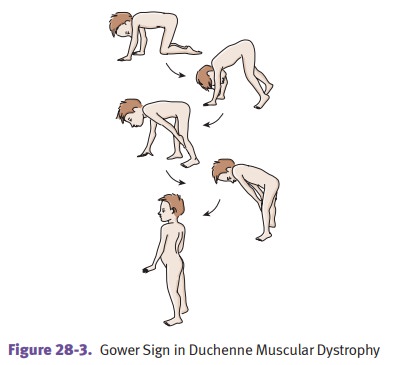Chapter: Pathology: Skeletal Muscle and Peripheral Nerve Pathology
Muscular Dystrophy
MUSCULAR DYSTROPHY
Duchenne
muscular dystrophy is a recessive X-linked form of muscular dystrophy leading to rapid progression
of muscle degeneration. It is the most common and severe form of muscular
dystrophy. The affected gene is the dystrophin gene on the X chromosome (Xp21);
dystrophin protein is an important muscle structural protein, and mutation
results in a virtual absence of the dystrophin protein.
Affected boys are normal at
birth but have onset of symptoms by age 5. Clinical features include:
•
Progressive muscular weakness
•
Calf pseudohypertrophy
•
Proximal weakness of shoulder and pelvic girdles
•
Possible heart failure and arrhythmias
•
Respiratory insufficiency and pulmonary infections as a sult of
decreased mucociliary clearance
Lab studies show elevated
serum creatine kinase. Muscle biopsy shows muscle fibers of various sizes;
necrosis, degeneration, and regeneration of fibers; fibrosis; and fatty
infiltration. Immunostains show decreased dystrophin protein. Diagnosis can
also be confirmed with genetic testing.
Becker muscular dystrophy is
a recessive X-linked inherited disorder leading to slowly progressive muscle
weakness of the legs and pelvis.
•
Less severe than Duchenne
•
Not as common as Duchenne as a later onset than Duchenne, with
variable progression
•
Mutation produces an altered dystrophin protein
•
Cardiac involvement is rare, and patients can have relatively
normal lifespan

Related Topics